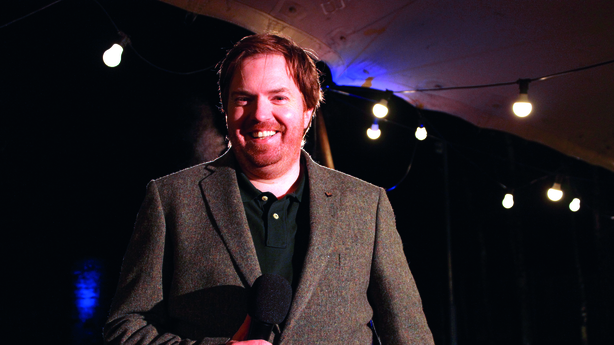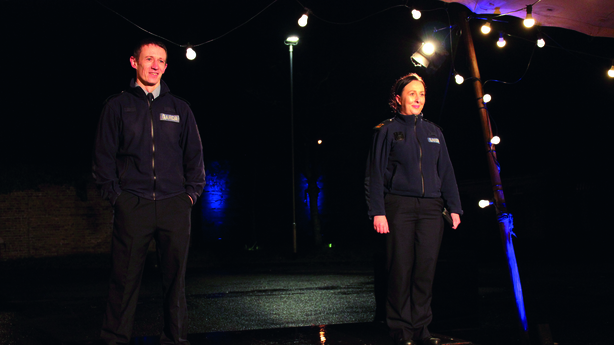In his new show, comic Bernard O'Shea learns on the job in a number of professions, while at the same time, teaching his mentors the basics of stand-up. He talks to Darragh McManus about putting on a show in a pandemic.
Bernard O'Shea has done all sorts of things in his time on our TV screens: sketches, candid camera, road-trips with Marty Morrissey, and of course, his unforgettable turn as a certain grumpy 1980s Midlands man called Eamon.
His latest show sees him take on yet another new role – or rather, a few of them. In the three-part Bernard’s Working Comics, the Laois funny-man acts as mentor to a number of aspiring stand-up comedians, while simultaneously trying his hand at various jobs, within An Garda Siochána, Iarnród Éireann and Fota Island Wildlife Park.
It sounds like a hell of a workload and that’s without factoring in Covid-related hassles surrounding production, but well worth doing, says Bernard. "This kind of television is completely different. It’s my first step into observational documentary," he says, "and there are different pressures. With scripted TV, if it’s not right on the page and you go to film it, you’re in dire straits – you can’t fix it with a crew and actors waiting on set. With ob-doc, it’s more like metalwork: if it doesn’t work, we can weld on another bit.
"But there was also the pressure of not knowing how to do this type of programme. You have to build up a relationship and trust with the people you’ll be working with; they’re giving up a huge part of what they do, exposing themselves. You’re asking a lot of them. But fundamentally, I did enjoy it."

So how does the show work? "I go into those organisations and work with them, sometimes with the people who ended up doing stand-up, but not always. Find out what their jobs entailed, what they’re like as people. And I get some of them to agree to try comedy, and do workshops with them."
On one side, he got the chance to "have a go at some things". Fota involved helping with the animals and – yes – "shovelling a lot of poo". With the Guards, Bernard adds, "Obviously, I couldn’t arrest someone, but I shadowed them for about a month. And then Iarnród Éireann, it’s so spread-out and we were on the trains a lot, sometimes with people who ended up doing comedy."
His other aim was to get these volunteers on stage "in their most natural form. Most comedians are a heightened version of themselves anyway. With one or two people, I felt, 'I don’t need to do anything with them’ – but everyone needs to prepare for a comedy set. If you have a funny story, amongst your friends, you’re brilliant at telling it – that, transferred to an audience who don’t know you, is an entirely different thing. It needs to be moulded and put in another way.
"So we used a few simple games as a possible way into it, but when they go on stage, it’s all them. We’d go through ideas, ask them to repeat something, I might make suggestions on how to improve it, but you don’t want to be heavy-handed. Otherwise, you might as well just write a script and get them to perform it."
Was it hard to get a Guard to commit to doing stand-up, I wonder? In fact, they got two. Bernard says, "One of them says to me in the first episode, ‘I’m worried ’cause I could get sacked or sued.’ And I said to him, ‘That’s a genuine, real worry for you, but for an audience member, that’s like, woohoo!’ It’s great that they went ahead with it."
Sadly, because of Covid restrictions, the newbies "didn’t fully get the experience of being in a comedy room. Their sets had to be outside, three metres apart…and everyone wearing a mask!" But, Bernard adds, "They still got the same feeling of ‘Oh my God! I can’t believe I’m about to do this!’"

Comedy, he accepts, is very subjective: "People either like you or they don’t; everyone has their own opinion and they’re entitled to it. Bridget & Eamon had a bit of a polarising effect. We liked it and obviously other people liked it too or we wouldn’t have got four years out of it. But we were never sitting back, waiting on the plaudits. You know a certain percentage won’t like what you do. And at least you’re getting a reaction – people are having a conversation about it."
Is there any chance of the show coming back after a four-year hiatus? "I don’t know," Bernard says. "Really, it’s RTÉ’s decision. But Jen is doing full-time radio, I’ve a few projects here and there…it’s a difficult one. We were unbelievably happy that we got to do four seasons. We were blessed, so maybe that’s it for the show. Because it’s set in the ’80s, it’ll hopefully age well and be on telly for years to come."
Off-screen, Bernard has also turned his hand to writing books rather than scripts. My Wife is Married to a Feckin’ Eejit came out in 2019; Manopause was published late last year. "Some bits were easier than others to write," he admits. "I wrote it during lockdown and it was a bit like doing a stand-up gig on a word processor: putting down ideas, looking back on things that happened. A much different skill and collaborative process. Books are hard! But it was enjoyable. You can talk to your editor, whereas a script is a blueprint for what you’re going to do and if it’s wrong, you’re in trouble.
"I’d like to write fiction but I’d like to become a better writer first. I know I have certain limitations and would love to develop that part of me. But I need to read a hell of a lot more, I need time and space. And books are sort of terrifying, it’s like you’re writing into the universe – nobody is there to respond. Until it goes on the shelf, you really don’t know."


